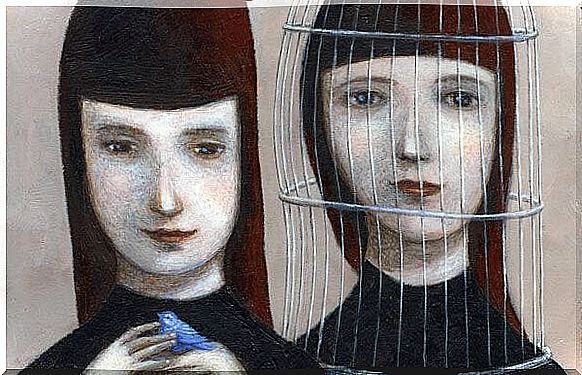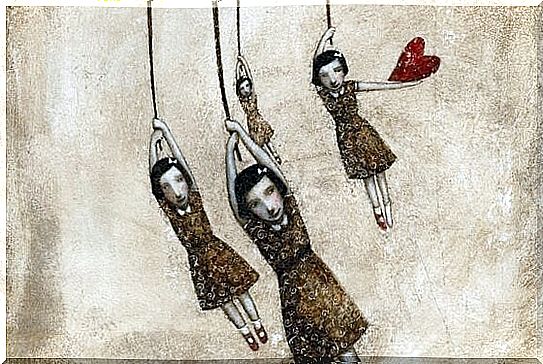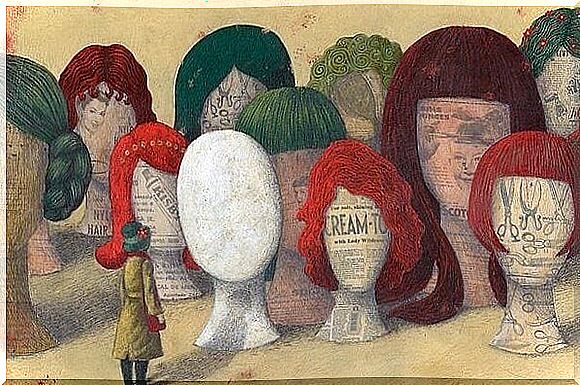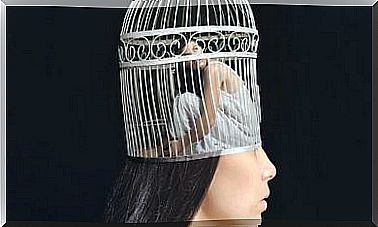Narcissistic Families Breed Emotional Pain

Narcissistic families are like spiders, trapping their children in a web of emotional distress.
In this kind of family dynamics, there is always a person who puts his own needs ahead of everyone else’s, and thus achieves absolute power. They use it to manipulate others with the goal of feeling cared for, recognized and validated at all levels.
People who grow up in dysfunctional environments like this say that their family looks perfect on the outside, but on the inside it is an endless nightmare. It is not easy to get out of the situation.
Although the bonds that develop in each family have their own fingerprints, they still have some important things in common.
The most characteristic feature of narcissistic families is the existence of very specific but unspoken rules. They are rules that are rolled around a person. They take away the rights and recognition from everyone else.
Therefore , it is common for children to lack an emotional connection to their parents. The parents look down on them and subject them to quiet but prolonged abuse.
The truth about the unhealthy family dynamics is often silenced forever by cutting branches from the family tree.
In fact, the moment the child grows up, and finally manages to escape from their oppressive childhood environment, they are branded as a “bad child” because they leave the family, because they dare to cut ties.

Scapegoats
Sara is 20 years old and studying psychology. It’s been a year since she stopped living with her parents, and now she wants to start life anew, at a distance, to gain perspective and put the pieces of herself back together so she can get over her past and try to move on.
Her scars come from the narcissistic family she grew up in, where both her parents played the game of power.
Her father suffered from a type of personality disorder. She knows it now, thanks to her studies. But no one even dared to suggest that he get professional help, because the context in which he lived enabled him to function well despite his condition.
Her mother was crucial in that regard, but she was also one of his victims. She gave in to all his needs and never managed to set boundaries.
Sara was the scapegoat, the object of projection for her narcissistic father. The recipient of his frustration, mistakes and anger.
But her older sister, on the other hand, was the favorite child. He shaped her into his own image. And for some reason, he thought she was more talented than Sara. That situation affected Sara so much that she began to think that something was wrong with her.

Common characteristics of narcissistic families
When you are part of this family portrait, it is not easy to escape, as growing up with it involves taking on many destructive mandates, through patterns and ideas that have a significant impact on a child’s mind. Here are some common characteristics of narcissistic families:
- You behave as if your family is the best, and you tell no one outside what is going on. Narcissistic families care a lot about their appearance. In fact, they often say things like “we have no problems, we are the perfect family.”
- Totally dysfunctional parents. The role of a parent in a normal family is to provide security, love, education and emotional nourishment to the children. In narcissistic families, the child has only one duty: to nurture his parents.
- Lack of effective communication. The most common form of communication in narcissistic families is triangulation. In other words, they are never direct, and they exhibit passive-aggressive behavior based on tension and mistrust. For example, in Sara’s case, every order, wish, or comment her father addressed to her came from her mother. He used her as an intermediary to make Sarah obey.
How can one get out of a narcissistic family environment?
In Huckleberry Finn , Mark Twain wrote that we do not need to let family wounds define us. There is always a bit of your true self hidden somewhere in your heart that is still smiling and alive, and that can lead you from absolutely nothing to happiness.
To remove yourself from the desolate, poisoned environment, think of the following:
- Understand that people with a narcissistic behavior usually struggle to change. There are therapies they can try, but very few take the plunge and admit wrong.
- Try not to feel guilty for what your narcissistic family members are doing. Use cognitive protection strategies so that you do not end up like Sara, and think that there is something wrong with yourself.
- It is useless to talk to a narcissist about your feelings. They’ll probably just hurt you even more. Limit yourself to say things like, “I understand what you say, but I will not let you …”, “You must understand that you do not have the right to …”, and “I pray that from now on …” Put borders with self-confidence.
- Find allies within your family or social circle who can understand you and support you.
- Create a distance between yourself and the narcissistic family member. That does not mean you have to cut all ties to them. But make sure you know clearly what situations you can handle and how often you want to face them.

Not only is it unhealthy to live in an environment where emotional principles are distorted, it is unbearable, especially for children.
When they grow up, they are often unable to say no to people, or understand that they have the right to set boundaries. They have trouble expressing their own wants and needs, and choose not to tolerate things.









